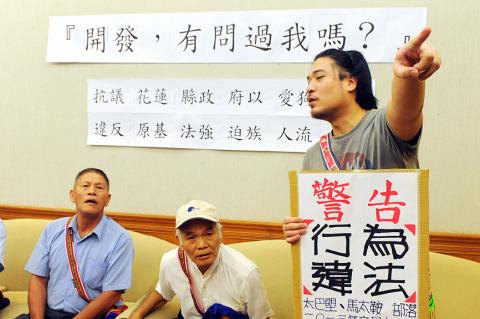A group of Amis Aborigines yesterday held a news conference in Taipei to protest against development projects launched by the Hualien County Government, accusing it of forcibly seizing their traditional domain and threatening their survival.
“The land on which I am living and farming has always been ours for as long as I can remember, and I am 63,” Karo Ona, an Amis farmer from Fenglin Township (鳳林), told the news conference. “I do not understand why the government has to take my land. I do not know what to do to stop it — without the land, I do not know how I can make a living.”
Karo said he and his neighbors have received a notice from the county government, asking them to tear demolish their homes and move away from a plot of land right on the border between Fenglin and Guangfu (光復) townships. The county wants to build a stray dog shelter on the site.

Photo: CNA
“I wonder if the county government considers dogs more important than people, so it wants to drive us away to make way for a dog shelter. But is not the government’s job to take good care of its people?” farmer Cunsing Rokateh said. “The problem is we do not have another place to move to even if we were willing to move.”
Namoh Nofu, an Aboriginal rights advocate who is from the area, said that in the past decade, the county government has planned development projects for about 1,400 hectares of land around the border area of Fenglin and Guangfu townships, which is the traditional domain of the Amis villages of Tafalong and Fata’an.
“The development projects include car-racing tracks, a camping park, golf courses, holiday resorts and an ‘eco-friendly industrial park,’” Namoh said. “However, the county government has never consulted local Amis villagers before coming up with the plans. It simply pretends that it does not know these are lands on which the Amis of Tafalong and Fata’an villages have lived for thousands of years.”
Namoh Fono, the head of Beifu Village (北富) in Guangfu Township, said the Amis have no written proof of land ownership, “but it is an unequal battle because Amis do not have a writing system, though everyone among us knows which plot of land belongs to which family or individual.”
However, Pasang Hsiao (蕭世暉), a representative of Indigenous Peoples Action Coalition of Taiwan, said whether there is written proof of ownership is not important.
“The Council of Indigenous Peoples have designated ‘Aboriginal townships’ and these designated townships should be considered traditional Aboriginal domains,” he said. “Therefore, any development project that involves Aboriginal townships should have consent of the locals, as stipulated by the Aboriginal Basic Act (原住民族基本法).

A Taiwanese software developer has created a generative artificial intelligence (AI) model to help people use AI without exposing sensitive data, project head Huang Chung-hsiao (黃崇校) said yesterday. Huang, a 55-year-old coder leading a US-based team, said that concerns over data privacy and security in popular generative AIs such as ChatGPT and DeepSeek motivated him to develop a personal AI assistant named “Mei.” One of the biggest security flaws with cloud-based algorithms is that users are required to hand over personal information to access the service, giving developers the opportunity to mine user data, he said. For this reason, many government agencies and

The National Fire Agency on Thursday said a series of drills simulating a magnitude 8.5 earthquake would be held in September to enhance the government’s emergency response capabilities. Since earthquakes cannot be predicted, only by continuously promoting disaster prevention measures could Taiwan enhance its resilience to earthquakes, agency Director-General Hsiao Huan-chang (蕭煥章) said in a news release. The exercises would be held to mark annual National Disaster Prevention Day on Sept. 21, the aim of which is to test Taiwan’s preparedness and improve its earthquake resilience in case of a major temblor, Hsiao said. As part of those drills, an earthquake alert would

DEFENSE: The National Security Bureau promised to expand communication and intelligence cooperation with global partners and enhance its strategic analytical skills China has not only increased military exercises and “gray zone” tactics against Taiwan this year, but also continues to recruit military personnel for espionage, the National Security Bureau (NSB) said yesterday in a report to the Legislative Yuan. The bureau submitted the report ahead of NSB Director-General Tsai Ming-yen’s (蔡明彥) appearance before the Foreign and National Defense Committee today. Last year, the Chinese People’s Liberation Army (PLA) conducted “Joint Sword-2024A and B” military exercises targeting Taiwan and carried out 40 combat readiness patrols, the bureau said. In addition, Chinese military aircraft entered Taiwan’s airspace 3,070 times last year, up about

STRICTER ENFORCEMENT: Taipei authorities warned against drunk cycling after a sharp rise in riding under the influence, urging greater public awareness of its illegality Taipei authorities have issued a public warning urging people not to ride bicycles after consuming alcohol, following a sharp rise in riding under the influence (DUI) cases involving bicycles. Five hundred and seven people were charged with DUI last year while riding YouBikes, personal bicycles, or other self-propelled two-wheelers — a fourfold increase from the previous year, data released by the Taipei Police Department’s Traffic Division showed. Of these, 33 cases were considered severe enough to be prosecuted under “offenses against public safety,” the data showed. Under the Road Traffic Management and Penalty Act (道路交通管理處罰條例), bicycles — including YouBikes and other